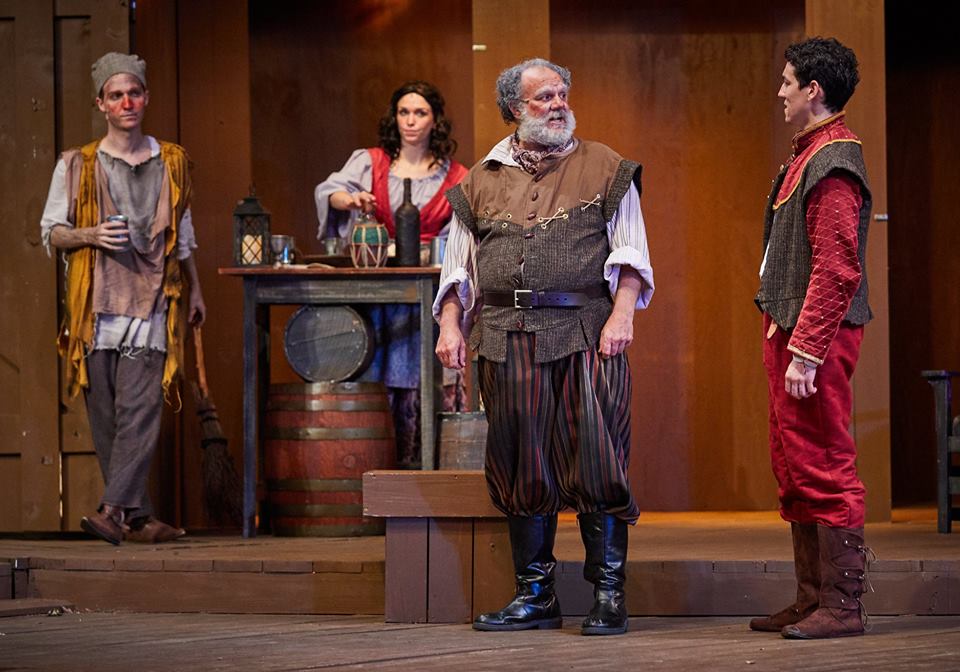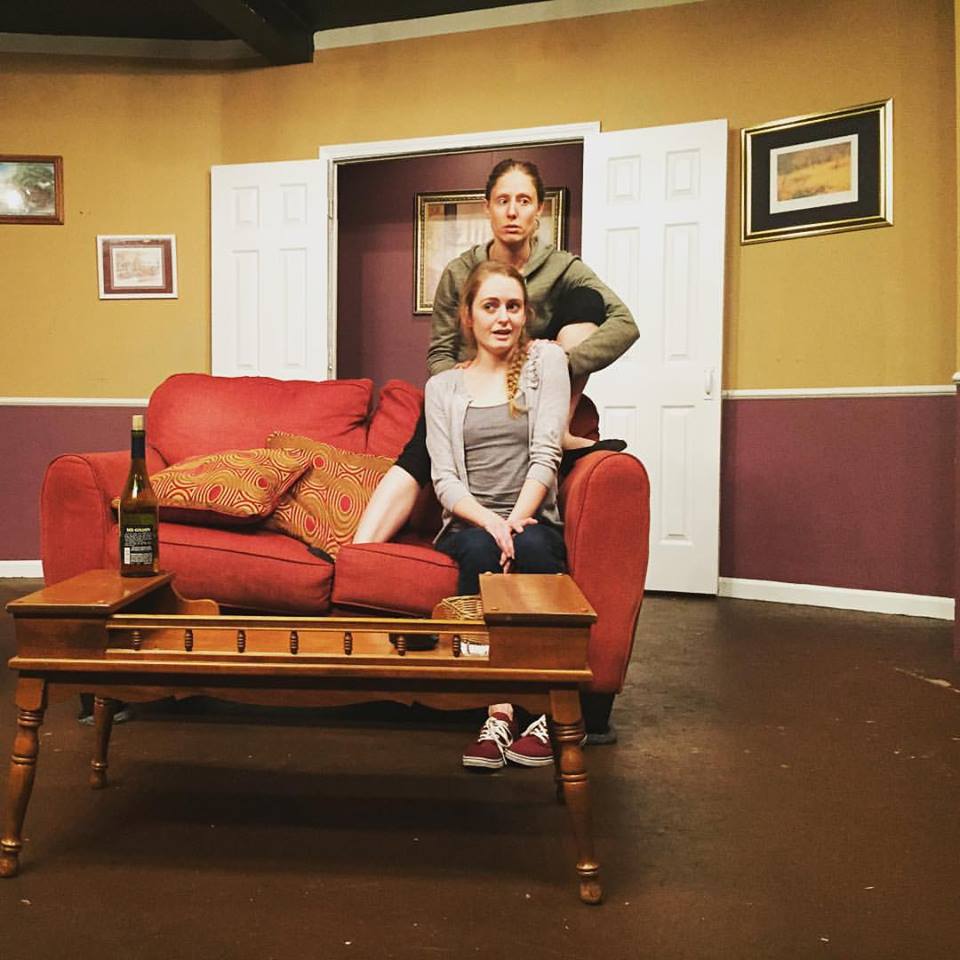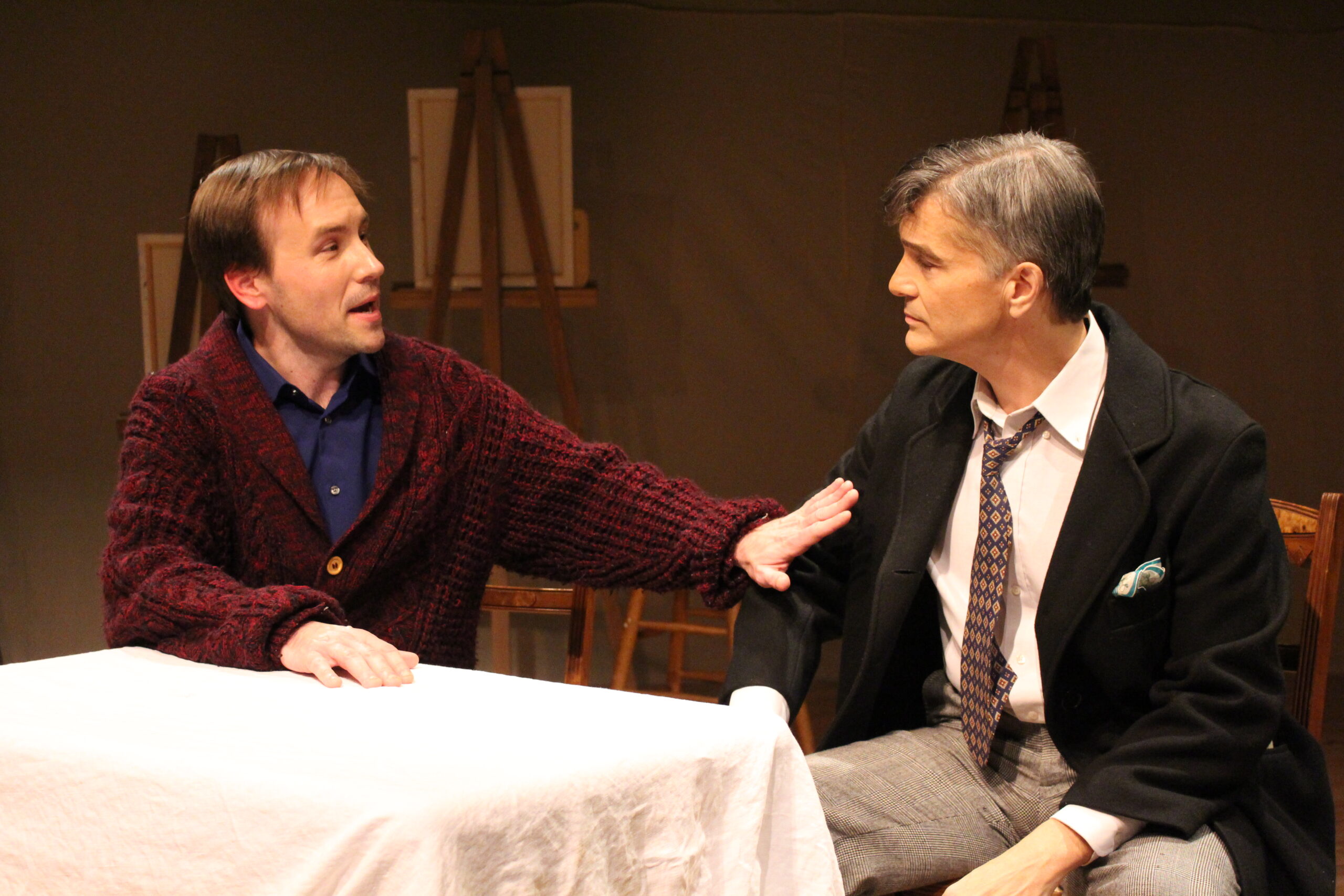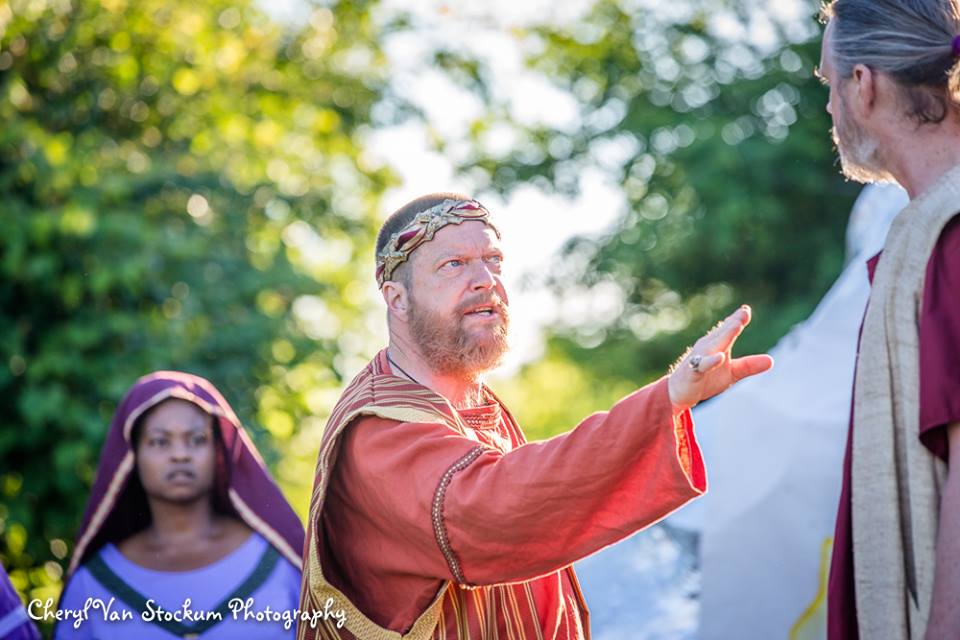[box_dark]To support Arts-Louisville.com, click here to make a donation![/box_dark]
Neill Robertson, Hallie Dizdarevic, J. Barrett Cooper, & Zachary Burrell. Photo: Bill Brymer.
Henry IV, Part 1
By William Shakespeare
Directed by Amy Attaway
Review by Cristina Martin
Entire contents are copyright © 2018 by Cristina Martin. All rights reserved.
What more pleasant way to spend a summer evening than outdoors in the heart of Old Louisville, surrounded by green space, with some of the loveliest turns of phrase ever written in the English language wafting on the breeze? Thanks to Kentucky Shakespeare and its supporters, we can do just that – free of charge – virtually all summer long in Louisville. What a treat, indeed!
There’s a reason why Shakespeare is Shakespeare. The incomparable craftsmanship, the variegated layers of meaning, the artful complexity of character and the nuanced literary texture that are all a part of the Bard’s genius are exactly what make his work timeless and universally appealing. Kentucky Shakespeare’s vision statement holds that “Shakespeare belongs to everyone, regardless of age, geography, or socioeconomic background.” How fitting, and how fortunate for all of us, that he should be offered to the public free as the air we breathe.
The second show to open this season as part of the 2018 Festival in Central Park is Henry IV, Part 1, which happens to be the second in Shakespeare’s Henriad, a sequence of four history plays depicting the English monarchy and its political intrigues in the fourteenth and fifteenth centuries. Richard II, the first in the series, was produced as part of 2017’s Festival; next year promises Henry IV, Part 2, with Henry V presumably rounding out the tetralogy the following year. Lest you should be put off by the histories, take heart: under Amy Attaway’s clear-eyed direction, this script is much more than battle plans and sword fights (although we get those, too, to great effect). The production balances action with a development of the human element that allows even lesser characters to move and breathe in three dimensions.
The production includes a prologue and an epilogue beautifully adapted by Gregory Maupin. This material, presented by the ensemble, serves to introduce the characters, catch us up historically, and sum things up at the end so that we’re ready for the next installment of the Henriad next year, in which many of the characters we encounter in Henry IV, Part 1 recur. If you listen carefully, it’s really not necessary to have any previous familiarity with the play to understand exactly what’s going on. The music throughout the show, composed by Scott Carney and Wax Fang, always complements the action without overwhelming it and is period appropriate while remaining fresh and exciting. Donna Lawrence-Downs’ costumes are gorgeous and well coordinated, some so sumptuous-looking, you just want to reach out and touch them.
In the prologue, we meet the three Henrys who are at the crux of the action: King Henry IV (Tom Luce), his son and heir apparent Prince Hal (Zachary Burrell), and Henry Percy, a.k.a. Hotspur (Jon Patrick O’Brien), son of the Earl of Northumberland (Jon Huffman). The year is 1402. King Henry IV deposed Richard II to take the throne in 1399, and while Northumberland and Hotspur were initially on Henry IV’s side, disagreements ensue, loyalties are strained, and they end up joining the Scots and Welsh in rebelling against the king.
Tom Luce brings dignity and depth to his regal role. On Paul Owen’s cleverly designed, uncomplicated set, the scenes at court take place stage left, while stage right is reserved for the Boar’s Head Tavern in Eastcheap, the decidedly less dignified hangout of Prince Hal and his companions. In contrast to the hustle and bustle of Eastcheap, the king and his courtiers move noticeably little in the course of some of the court scenes. This is a brilliant bit of staging that not only sets the solemn tone but causes us to focus on the actors’ language in a way that would have been lost had there been more moving around. The king has a fitting throne, but interestingly, he’s seen standing more than sitting in it, which highlights the fact that he is inwardly far from complacent. The Earl of Westmorland (Tony Milder), Sir Walter Blunt (Dathan Hooper), and Prince John of Lancaster (Will DeVary) stand solidly around him, signifying their loyalty to the king.
In addition to his political preoccupations, like many a parent concerned about what his child will become, King Henry IV is genuinely troubled by Prince Hal’s habits, the company he keeps, and whether he has what it takes to eventually succeed him as king. Shakespeare makes much of the contrast between the two younger Henrys. Jon Patrick O’Brien’s forceful determination shows us immediately whence Hotspur earned his nickname. Next to Zachary Burrell’s Hal, who seems much more concerned with carousing and cutting up with his friends Sir John Falstaff (J. Barrett Cooper), Poins (Crystian Wiltshire), Bardolph (Neill Robertson) and Peto (Shaleen Cholera) than with royal matters, we’re almost inclined to agree with King Henry that it might’ve been better had he been blessed with a serious and ambitious son like Hotspur instead. But Prince Hal’s character evolves, and Burrell brings out his increasingly evident depth with a subtle grace. And as for Hotspur, he’s far from a one-dimensional. The tender playfulness between him and his wife, Lady Percy (Ernaisja Curry) was beautifully played, particularly in a breathtaking, sensuous leave-taking scene featuring the two of them.
Henry IV, Part 1 isn’t known for containing any especially large parts for women, but all four female actors in this production shine under Attaway’s direction. Curry makes a lively and articulate noblewoman, as does Abigail Bailey Maupin in the role of the Welsh Lady Mortimer, though everything she says (and sings!) is – most impressively — entirely in Welsh. We find ourselves in the same helpless state of incomprehension as her hapless husband, the Earl of Mortimer (Tony Milder), who has clearly made a political alliance and has no language in common with his own wife. I hope I wasn’t remiss in finding the situation very funny, especially when Lady Mortimer’s father, Owen Glendower (Gregory Maupin) offers to translate for the English speakers. Something about Glendower’s over assertion of how good his English is, Gregory Maupin’s fine comedic timing, and perhaps his build and mannerisms, reminiscent of John Cleese in many a Monty Python skit, set me to giggling.
Abigail Bailey Maupin also has a fine turn as Sir Richard Vernon, one of the rebels on Mortimer’s side. Along with Northumberland’s brother the Earl of Worcester (Kyle Ware) and the Earl of Douglas (Crystian Wiltshire), Vernon fights on Hotspur’s side, an earnest and worthy adversary to King Henry.
In Eastcheap, Mistress Quickly (Jennifer Pennington) and Doll Tearsheet (Hallie Dizdarevic) are kept busy taking care of their tavern customers, but shrinking violets these ladies are not: these strong, cheeky women stand up for themselves and give as good as they get from the men when the insults start to fly.
And fly they do, deliciously! The Eastcheap crew is filled with good humor and energy, an excellent counterweight to the sober affairs of state. At their heart is Shakespeare’s beloved Sir John Falstaff, a rogue of magnanimous proportions if there ever was one. J. Barrett Cooper plays him brilliantly. Falstaff is hilarious and a good-time guy for sure, but in Cooper’s interpretation, he is refreshingly more than a portly old sot, more than a Bacchanalian buffoon standing in contrast with the lofty world of king and country. Cooper succeeds at bringing out Falstaff’s melancholy and gives him depth in a way not all interpreters of the part do. He’s especially good in the scene where he’s playacting as the king and in his addresses to the audience. Falstaff even prompts us to ponder profound questions such as What is honor? and Is it worth being courageous if you end up dead? He may lead a dissolute life by some standards, but Falstaff is clearly a vehicle for some of the most important things Shakespeare has to say. It is no wonder that Orson Welles called him, “Shakespeare’s greatest creation.”
There were a few more crackles and mic problems on opening night of Henry IV, Part 1 than is usual with Kentucky Shakespeare, but no sound system is perfect. In general, we can hear every syllable the actors utter perfectly, which is no small feat for an open-air production. The lighting, designed by Casey Clark, is warm and inviting, illuminating the stage exactly as the natural light of the evening fades.
My only other criticism would be that, while expertly choreographed by Eric Frantz, the sword fighting at the play’s climax seemed just a hair – a hair – tentative, as though the combatants were only about 99% sure when they struck that their partners would move to defend themselves as choreographed. This lent something of a stylized look to the combat, which might even have been intentional. In any case, kudos to all the warriors for executing this enormously taxing sequence with gusto. Indeed, how all of the actors run around in the summer heat with the consistent energy they do in what look to be heavy costumes is extraordinary. Several of them play more than one role in this play, and they perform virtually every day of the week. What’s more, most of them are cast in at least one of the two other Kentucky Shakespeare productions (The Comedy of Errors and Othello), which will be performed in rotating repertory along with Henry IV, Part 1 beginning soon. Think about that for just a minute. These people are amazing.
Many years ago, in a different state and a different time, I experienced “Shakespeare in the Park” for one of the first times I can remember. I sweat and itch just to think about it. There were no seats, so we sat in some of the prickliest grass I have ever encountered, and the acoustics were so bad I couldn’t stop thinking about the joke where the poor sap at the back of the crowd during the Sermon on the Mount is convinced Jesus said, “Blessed are the cheese makers.” I came away with a thousand bug bites and no clue as to why people thought Shakespeare was all that. Poor Bard. In the wrong hands, he can be butchered in a million ways.
Our Kentucky Shakespeare Festival, however, does him enormous credit. This group of consummate professionals mines the authentic richness in which we can all find something that speaks to us. I’m so proud to call it ours. In an Arts landscape with its share of gems, Kentucky Shakespeare is a mother lode.
So grab your friends, especially any Shakespeare skeptics or Shakespeare virgins, and head to Central Park one evening this summer. You’ll be delighted.
Henry IV, Part 1
Kentucky Shakespeare
May 30 – August 5, 2018
Shakespeare Festival in Central Park
C. Douglas Ramey Amphitheater
1340 S. Fourth St.
Louisville, KY 40208
(502) 574-990
kyshakespeare.com
Henry IV, Part 1 playing thru June 24, then July 10, 13, 15, 19 & 21.
Admission is free. Everyone welcome, including pets.
Food trucks open at 6:30 p.m.; Will’s Tavern begins serving at 7:00 p.m.
Pre-Show begins at 7:15 p.m., with main stage production at 8:00 p.m.
A lover of the arts in every form, Cristina Martin has a background in theatre, dance, and classical music. A native of Chicago, she currently lives in Louisville with her husband, three active young boys, two rambunctious dogs and a cat as old as the hills.





